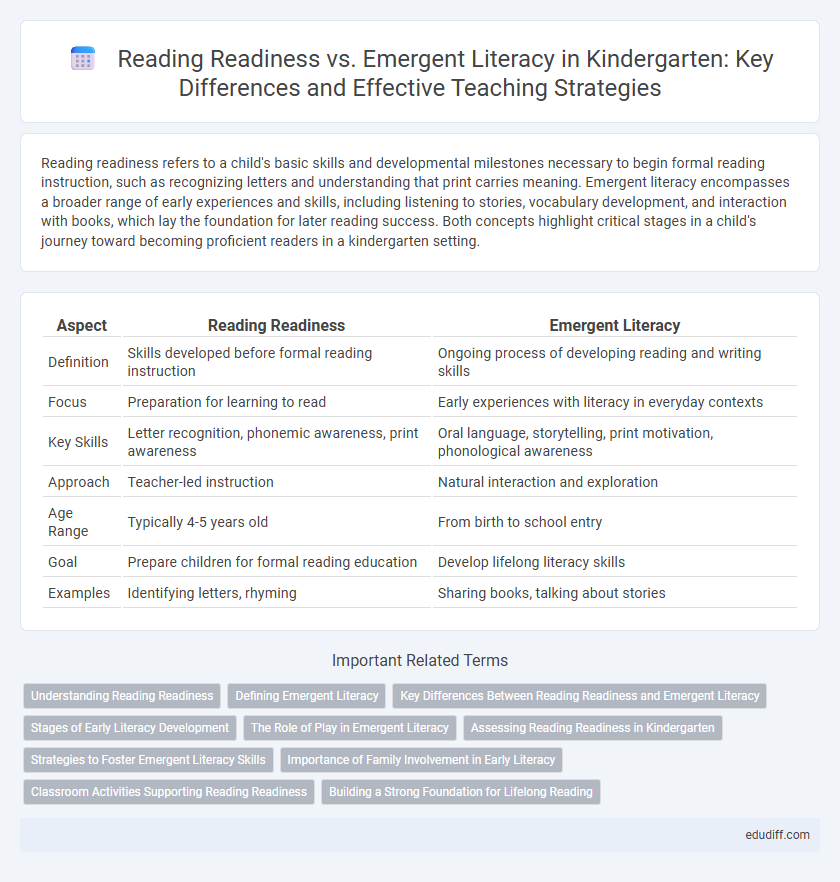Reading readiness refers to a child's basic skills and developmental milestones necessary to begin formal reading instruction, such as recognizing letters and understanding that print carries meaning. Emergent literacy encompasses a broader range of early experiences and skills, including listening to stories, vocabulary development, and interaction with books, which lay the foundation for later reading success. Both concepts highlight critical stages in a child's journey toward becoming proficient readers in a kindergarten setting.
Table of Comparison
| Aspect | Reading Readiness | Emergent Literacy |
|---|---|---|
| Definition | Skills developed before formal reading instruction | Ongoing process of developing reading and writing skills |
| Focus | Preparation for learning to read | Early experiences with literacy in everyday contexts |
| Key Skills | Letter recognition, phonemic awareness, print awareness | Oral language, storytelling, print motivation, phonological awareness |
| Approach | Teacher-led instruction | Natural interaction and exploration |
| Age Range | Typically 4-5 years old | From birth to school entry |
| Goal | Prepare children for formal reading education | Develop lifelong literacy skills |
| Examples | Identifying letters, rhyming | Sharing books, talking about stories |
Understanding Reading Readiness
Reading readiness refers to a child's developmental stage characterized by foundational skills, such as letter recognition, phonemic awareness, and vocabulary growth, necessary for formal reading instruction. Emergent literacy encompasses a broader range of early experiences, including storytelling, print awareness, and environmental print recognition, which collectively support language development and later reading success. Understanding reading readiness helps educators tailor kindergarten curricula to effectively bridge early literacy behaviors with structured reading activities.
Defining Emergent Literacy
Emergent literacy refers to the skills, knowledge, and attitudes that precede formal reading and writing instruction in kindergarten, encompassing a child's early experiences with books, print, and storytelling. It includes abilities such as recognizing letters, understanding that print carries meaning, and developing vocabulary and phonological awareness. These foundational skills distinguish emergent literacy from reading readiness, which often emphasizes the child's preparedness for direct reading instruction.
Key Differences Between Reading Readiness and Emergent Literacy
Reading readiness refers to a child's developmental stage when they possess the foundational skills necessary to begin formal reading instruction, such as letter recognition and phonemic awareness. Emergent literacy encompasses a broader range of early experiences and behaviors, including storytelling, print awareness, and vocabulary development, that lay the groundwork for later reading success. Key differences lie in reading readiness being a milestone signaling preparedness for reading, while emergent literacy represents a continuous, holistic process of building literacy skills from infancy through early childhood.
Stages of Early Literacy Development
Reading readiness focuses on a child's ability to understand basic concepts of print and recognize letter sounds, marking the initial phase of early literacy development. Emergent literacy encompasses a broader range of skills, including vocabulary growth, storytelling, and print awareness, that unfold naturally through interactions and play. Key stages in early literacy development progress from recognizing symbols to decoding words and constructing meaning, essential for successful kindergarten reading acquisition.
The Role of Play in Emergent Literacy
Play fosters emergent literacy by creating meaningful, interactive experiences that help children develop language, print awareness, and narrative skills essential for reading readiness. Activities like storytelling, role-playing, and manipulating books during play build foundational literacy concepts in a natural, engaging context. Early childhood educators emphasize incorporating play to support cognitive and social development that directly enhances emergent literacy outcomes.
Assessing Reading Readiness in Kindergarten
Assessing reading readiness in kindergarten involves evaluating phonemic awareness, letter recognition, and vocabulary development to identify a child's ability to decode and comprehend text. Emergent literacy skills such as storytelling, print awareness, and listening comprehension serve as foundational indicators of potential reading success. Early screening tools like the DIBELS and PALS assessments provide quantitative data to tailor instruction and support individualized literacy development.
Strategies to Foster Emergent Literacy Skills
Fostering emergent literacy skills in kindergarten involves interactive activities that promote phonemic awareness, vocabulary development, and narrative skills through storytelling, shared reading, and playful letter exploration. Incorporating multisensory experiences such as singing, rhyming games, and hands-on writing exercises enhances children's ability to recognize sounds and patterns crucial for reading readiness. Consistent engagement with print-rich environments and supportive adult interaction builds foundational comprehension and communication abilities essential for early reading success.
Importance of Family Involvement in Early Literacy
Family involvement plays a critical role in both reading readiness and emergent literacy by creating a supportive environment where children develop essential language skills and a love for books. Engaging in shared reading, storytelling, and conversations at home enhances vocabulary, phonemic awareness, and comprehension, forming the foundation for successful reading acquisition in kindergarten. Research shows that children with active family participation demonstrate higher literacy achievement and greater motivation to learn, underscoring the importance of parental engagement in early literacy development.
Classroom Activities Supporting Reading Readiness
Classroom activities supporting reading readiness in kindergarten emphasize phonemic awareness, letter recognition, and vocabulary development to prepare children for formal reading instruction. Interactive storytelling, alphabet games, and rhyming exercises enhance emergent literacy by fostering print awareness and comprehension skills. These targeted activities create a foundation for decoding and fluency, bridging emergent literacy with successful reading readiness.
Building a Strong Foundation for Lifelong Reading
Reading readiness emphasizes mastering basic skills such as letter recognition and phonemic awareness, while emergent literacy focuses on children's natural interactions with books and print in their environment. Building a strong foundation for lifelong reading involves integrating these approaches to develop vocabulary, comprehension, and motivation at an early age. Research shows that combining structured skill development with rich literacy experiences enhances long-term reading success.
Reading readiness vs Emergent literacy Infographic

 edudiff.com
edudiff.com